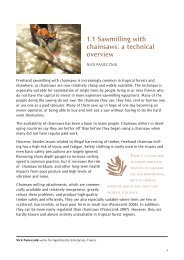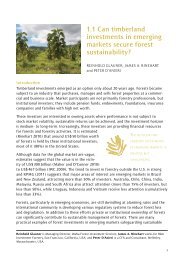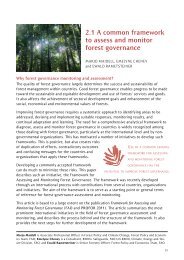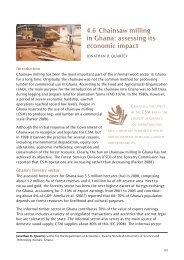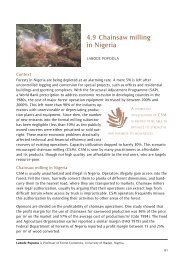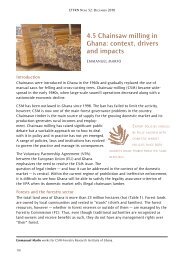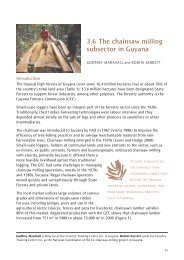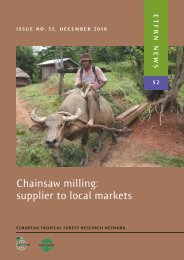Chainsaw milling: supplier to local markets - European Tropical ...
Chainsaw milling: supplier to local markets - European Tropical ...
Chainsaw milling: supplier to local markets - European Tropical ...
Create successful ePaper yourself
Turn your PDF publications into a flip-book with our unique Google optimized e-Paper software.
64<br />
ETFRN NEws 52: DEcEmbER 2010<br />
low-intensity logging or logging in small forest areas. The investment required is <strong>to</strong>o high<br />
for small areas and the cutting cycle of 20 years is unrealistic. Forest users do not adhere<br />
<strong>to</strong> the management system, but compliance is rarely controlled by the forest service (pacheco<br />
et al. 2008). many entrepreneurs in the forest sec<strong>to</strong>r have developed strategies <strong>to</strong><br />
make use of this weakness in the system.<br />
because access <strong>to</strong> small-scale logging permits is limited <strong>to</strong> forest owners, entrepreneurs<br />
(including large and small enterprises, intermediaries and consultants) have developed<br />
innovative strategies <strong>to</strong> facilitate forest owners’ access <strong>to</strong> logging permits. The entrepreneurs<br />
arrange all the paperwork for the forest owners, harvest the trees and pay for the<br />
timber. Entrepreneurs prefer <strong>to</strong> use small-scale logging permits — which are cheap and<br />
easily obtainable — instead of permits for larger forest areas, which require investments<br />
in sFm plans. This is especially prevalent where there is easy access <strong>to</strong> the forest.<br />
This practice allows timber enterprises <strong>to</strong> obtain cheap timber from forest owners without<br />
investing in sFm. as small-scale logging is widespread in the extensive forest areas owned<br />
by indigenous and farmers communities, the forest service has lost control over much<br />
of the forest. moreover, the large volume of cheap timber on the market threatens the<br />
economic viability of the communities, asls and private forest owners who comply with<br />
regulations.<br />
conclusion<br />
The success of the forest regime in bolivia is based on the participation of communities,<br />
farmers, private forest owners and asls in industrial timber logging from large management<br />
areas. The weakness of the regime is the lack of alternative, non-industrial systems<br />
of forest use for those who are not interested in industrial logging and long-term commitments<br />
<strong>to</strong> forest management but are eager <strong>to</strong> earn income from selling trees on their<br />
land.<br />
under the 1996 forest law, the illegal practice of chainsaw <strong>milling</strong> was reduced and alternative<br />
semi-industrial logging techniques appeared that better suited people’s needs. The<br />
rapid development of this timber production chain can largely be attributed <strong>to</strong> the denial<br />
of the importance of timber extraction from smaller forest areas by the forest service,<br />
who failed <strong>to</strong> develop applicable regulations or control small-scale logging. Forest management<br />
regulations — as well as the entire institutional framework set up by the government<br />
under the 1996 forest law — have been directed at servicing a limited number of<br />
vertically integrated enterprises and some large-scale community forestry initiatives and<br />
asls. servicing, moni<strong>to</strong>ring and controlling thousands of small-scale forest enterprises<br />
that source timber from thousands of private companies, farmers and community forests<br />
were never a priority. This omission caused a serious void in the forest regime and an increase<br />
in unsustainable logging practices. The bolivian case proves that providing realistic<br />
management and moni<strong>to</strong>ring options for small-scale logging practices are necessary <strong>to</strong><br />
keep the entire forest sec<strong>to</strong>r healthy.



